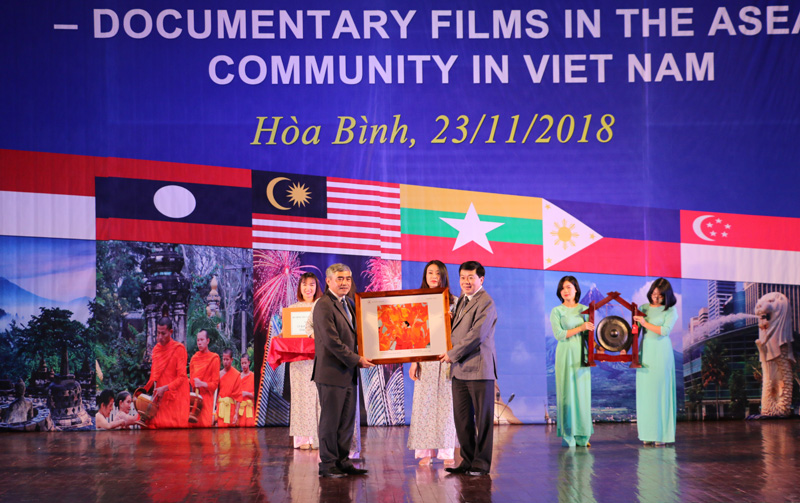
(HBO) – An exhibition of photos and documentary films has opened at the Hoa Binh Cultural Palace, featuring the land, people, environmental protection, climate change and ethnic groups in the ASEAN Community in Vietnam, which was organised by the Ministry of Information and Communications (MIC) in coordination with the People's Committee of Hoa Binh province.
The opening ceremony was attended by
representatives from ASEAN countries, including Op Sophy, Counsellor of the
Cambodian Embassy in Vietnam; Bour Lena Keo Mani, Second Secretary at the Lao
Embassy in Vietnam; Dhania, Second Secretary of the Indonesian Embassy in
Vietnam, Nguyen Minh Hong, MIC Deputy Minister; representatives of the External
Relations Department, International Cooperation Department, International Press
Cooperation Centre (MIC). Nguyen Van Chuong, Vice Chairman of the provincial
People's Committee also attended the event.

Delegates
cut the ribbon to launch the exhibition.
Photo, documentary film exhibition was part of
the government’s action programme on communicating and promoting the ASEAN and
the benefits brought about by the community.
The exhibition introduced over 300 photos and
nearly 60 documentary films which entered the final round of the International
Photo & Documentary Film Festival on the people and nations in the ASEAN
Community in 2010 when Vietnam took the role as the ASEAN Chair, the Photo and
Documentary Film Festival on Environmental Protection and Climate Change in
ASEAN Community 2013, and Photo and Documentary Film Festival on ethnic minorities
in ASEAN Community 2015 organised by the Ministry of Information and
Communications.
At the opening ceremony, MIC leaders handed over
Hoa Binh many photographic materials and meaningful documentary films.
The exhibition is scheduled to last until
November 28 at the Hoa Binh Cultural Palace. During the exhibition, delegations
from ASEAN embassies, and central agencies will visit some historical sites and
landscapes of the province.After the exhibition, all photos and films will
be presented to the provincial People's Committee for continuous communications
and promotion of the ASEAN Community./.
The Standing Board of the Hoa Binh provincial Party Committee has agreed in principle on a proposal by the Standing Board of the Party Committee of Hoa Binh city to gather feedback on the city’s 1:2000 zoning plan, which forms part of its broader urban development strategy.
Hoa Binh province has made notable progress in public administration reform and digital government development, with the satisfaction index among citizens and businesses reaching over 84%, according to recent government evaluations.
Thanks to great efforts by local authorities in recent times, the governance and public administration performance of Mai Chau district has been significantly improved.
In the afternoon of June 6, the Party Committee, the People's Council, the People's Committee and the Fatherland Front of Lac Son district solemnly held a meeting to celebrate the 139th anniversary of the district's founding (1886–2025) and the 79th anniversary of the establishment of the district's Party Committee (1946–2025). There was the attendance of Mr. Bui Van Thang, the Vice Chairman of the Provincial People's Council; Mr. Quach Tat Liem, the Vice Chairman of the Provincial People's Committee; Ms. Dang Bich Ngoc, the Deputy Head of the National Assembly Delegation of the province; as well as the former leaders of the province and district through various periods, who are the natives of the district.
Implementing the Politburo’s Resolution No. 57-NQ/TW on breakthroughs in science – technology, innovation, and digital transformation is a golden opportunity for the northern mountainous province of Hoa Binh to renew growth model, improve competitive edge and shorten digital gap.
Resolution 57-NQ/TW, issued by the Politburo on December 22, 2024, identifies sci-tech, innovation, and digital transformation as strategic breakthroughs to build a developed and prosperous nation. In Hoa Binh province, this spirit is not just a slogan, it’s being put into action through concrete initiatives that form a "new development triangle”: digital citizenship, digital economy, and digital administration.



